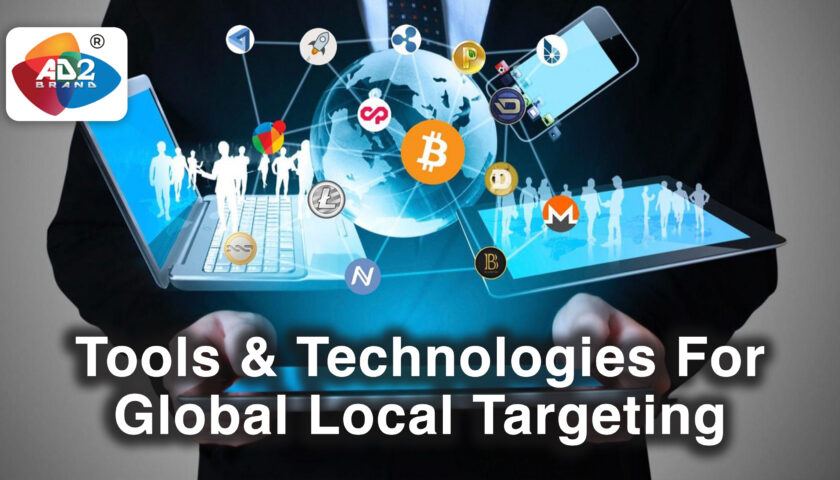Introduction
In today\’s highly competitive digital landscape, businesses are constantly seeking innovative ways to expand their reach and connect with their target audience on a global scale. Simultaneously, there\’s an increasing emphasis on local targeting to personalize marketing efforts for specific regions. This combination of global reach and local precision requires the use of advanced tools and technologies. In this comprehensive article, we will explore a wide range of strategies, platforms, and technologies that cater to global-local targeting. Whether you\’re a startup or an established enterprise, incorporating these solutions into your marketing arsenal can significantly enhance your brand\’s visibility, engagement, and conversion rates.
Geolocation Tools: Navigating Across Borders
Geolocation tools are the backbone of any global local targeting strategy. These technologies enable businesses to identify and understand the geographic location of their audience, allowing them to deliver targeted content, advertisements, and promotions. With the help of GPS data, IP addresses, and Wi-Fi signals, these tools can pinpoint a user\’s location with remarkable accuracy. Popular geolocation tools include:
1. Google Maps API: Leveraging Google\’s vast database, this API empowers developers to integrate interactive maps into their applications and websites, providing users with location-based services.
2. Geotargeting on Social Media Platforms: Social media giants like Facebook, Instagram, and Twitter offer geotargeting features that allow advertisers to target specific audiences based on their geographic location.
3. MaxMind: This popular geolocation service offers precise IP geolocation data, helping businesses customize content based on users\’ locations.
Hyper-Local Advertising: Reaching Local Audiences
Hyper-local advertising takes geolocation to the next level, targeting audiences within a specific radius of a physical location. This method is particularly effective for businesses with brick-and-mortar establishments or localized services. Key hyper-local advertising tools include:
1. Local Awareness Ads on Facebook: This advertising solution targets users who are near a business location, increasing foot traffic and driving potential customers to physical stores.
2. Google Local Pack: The local pack appears in Google search results and showcases three local businesses relevant to the user\’s query, along with essential information such as business hours, reviews, and contact details.
3. Beacon Technology: By leveraging Bluetooth Low Energy (BLE) beacons, businesses can send location-specific notifications, deals, and promotions to users who have opted into their beacon-enabled app.
Multilingual Content Management: Connecting with Diverse Audiences
As businesses expand globally, it becomes crucial to communicate effectively with audiences from different linguistic backgrounds. Multilingual content management systems (CMS) and translation tools play a pivotal role in achieving this goal. Some essential tools include:
1. WPML (WordPress Multilingual Plugin): For WordPress users, WPML offers seamless translation and management of multilingual content, ensuring a smooth user experience for international audiences.
2. Google Translate API: Google\’s translation API enables developers to integrate automatic language translation into their websites and applications, helping businesses cater to non-English speaking users.
3. Transifex: Transifex is a collaborative translation platform that streamlines the process of managing multilingual content, making it easier for businesses to handle translations efficiently.
Local Keyword Research: Unearthing Regional Insights
Effective local targeting requires a deep understanding of the keywords and search terms used by the target audience in specific regions. Local keyword research tools help businesses discover region-specific search trends and optimize their content accordingly. Some notable tools are:
1. Google Trends: Google Trends allows businesses to explore trending search queries in specific countries or regions, helping them tailor their content to match local interests.
2. Moz Local Keyword Explorer: This tool provides valuable insights into location-based keyword difficulty, search volume, and organic click-through rates, aiding businesses in making data-driven decisions.
3. SEMrush: With its local keyword tracking feature, SEMrush enables businesses to monitor their local SEO performance and compare it with competitors in their target regions.
Localized Social Media Management: Engaging Global Communities
Social media is a powerful tool for global-local targeting, but managing multiple accounts for various regions can be challenging. Localized social media management platforms streamline the process and enhance engagement with diverse communities. Prominent platforms include:
1. Hootsuite: Hootsuite allows businesses to manage multiple social media accounts, schedule posts, and monitor conversations across different regions, ensuring a consistent brand presence.
2. Buffer: Buffer\’s intuitive interface enables seamless scheduling and publishing of social media content, empowering businesses to tailor posts for specific audiences worldwide.
3. Sprout Social: This comprehensive social media management platform offers localized analytics, social listening, and customer engagement tools, fostering deeper connections with diverse communities.
Augmented Reality (AR) for Local Engagement
The integration of augmented reality in marketing strategies is a game-changer for global local targeting. AR technologies provide unique and interactive experiences to users, bridging the gap between the digital and physical realms. Businesses can use AR to engage local audiences in various ways, such as:
1. AR-Based Storefronts: Retailers can create AR storefronts that allow customers to virtually explore and experience products before making a purchase.
2. Local Landmark AR Experiences: Tourism businesses can offer AR-based guides that provide historical and cultural information about local landmarks when users visit these sites.
3. AR Ad Campaigns: Marketers can launch AR-powered advertisements that blend seamlessly with the user\’s real environment, captivating local audiences with innovative content.
Local Influencer Partnerships: Building Trust and Authority
Local influencers have a significant impact on their communities and can be instrumental in enhancing a brand\’s visibility and credibility. Partnering with relevant local influencers can strengthen a business\’s reputation and foster authentic connections with local audiences. Strategies for effective influencer partnerships include:
1. Researching Niche-Relevant Influencers: Businesses should identify influencers whose content aligns with their niche and resonates with their target audience.
2. Engaging in Authentic Collaborations: Genuine collaborations that focus on building a relationship with the influencer can result in more impactful and trustworthy campaigns.
3. Measuring ROI and Impact: Tracking the results of influencer campaigns helps businesses gauge their effectiveness and make data-driven decisions for future partnerships
Local Mobile Optimization: Enhancing User Experience
With the increasing prevalence of mobile devices, optimizing websites and applications for mobile users has become vital for successful global local targeting. Mobile optimization improves user experience and helps businesses capitalize on local search opportunities. Key elements of mobile optimization include:
1. Responsive Design: Websites with responsive design adapt seamlessly to various screen sizes, providing a consistent and user-friendly experience across devices.
2. Accelerated Mobile Pages (AMP): AMP improves page loading speed on mobile devices, reducing bounce rates and increasing the chances of conversions.
3. Mobile-First Indexing: Google\’s mobile-first indexing prioritizes the mobile version of a website when ranking search results, making mobile optimization crucial for SEO success.
Local Data Analytics: Measuring and Adapting
To gauge the success of global local targeting efforts, businesses must rely on data analytics to measure performance and adapt their strategies accordingly. Local data analytics tools enable businesses to monitor and optimize their campaigns effectively. Important data analytics tools include:
1. Google Analytics: This robust platform offers in-depth insights into website traffic, user behavior, and conversion rates, helping businesses understand their audience better.
2. Yext: Yext\’s analytics tools provide valuable data on local search performance, customer interactions, and brand sentiment, guiding businesses in making informed decisions.
3. Social Media Insights: Platforms like Facebook Insights, Twitter Analytics, and Instagram Insights offer detailed data on audience demographics, engagement, and reach, allowing businesses to fine-tune their content strategy.
FAQs
Q: What is global-local targeting?
A: Global local targeting is a marketing strategy that combines global reach with localized precision to engage specific audiences in different regions.
Q: How do geolocation tools work?
A: Geolocation tools use data such as GPS, IP addresses, and Wi-Fi signals to identify the geographic location of users, enabling targeted content delivery.
Q: Why is hyper-local advertising essential for local businesses? A: Hyper-local advertising targets audiences within proximity to a business, driving foot traffic and increasing visibility for local establishments.
Q: How can augmented reality enhance local engagement? A: Augmented reality provides interactive experiences to users in real-world environments, enabling businesses to offer unique and immersive content to local audiences.
Q: Why are local influencers valuable for brands? A: Local influencers have a strong connection with their communities, and partnering with them can enhance a brand\’s reputation and build trust among local audiences.
Q: How does mobile optimization impact local search performance? A: Mobile optimization improves user experience, reducing bounce rates and increasing the likelihood of appearing in local search results.
Conclusion:
In today\’s fast-paced and competitive digital landscape, businesses aiming to succeed on a global scale must embrace the power of local targeting. By incorporating advanced tools and technologies into their marketing strategies, companies can effectively reach and engage specific audiences in different regions, fostering brand visibility, credibility, and conversions.
Geolocation tools form the foundation of global local targeting, allowing businesses to deliver targeted content and promotions based on users\’ geographic locations. Hyper-local advertising takes this a step further, enabling businesses with physical locations to attract local customers through targeted advertising.
Multilingual content management systems and local keyword research tools aid businesses in communicating effectively with diverse audiences and understanding region-specific search trends, respectively. Localized social media management platforms streamline engagement with communities worldwide, while augmented reality offers innovative and interactive experiences to local audiences.
Local influencers can significantly impact a brand\’s reputation and connections with their communities, making them valuable partners for businesses seeking to build trust and authority in specific regions. Additionally, mobile optimization is crucial for optimizing user experience and capitalizing on local search opportunities.
Throughout this journey of global local targeting, data analytics tools provide valuable insights, enabling businesses to measure the success of their efforts and adapt their strategies accordingly.
For businesses looking to implement these tools and technologies seamlessly into their global local targeting strategies, partnering with an experienced marketing agency like Ad2Brand can be a game-changer. Ad2Brand marketing agency possesses the expertise to harness the power of these tools, tailoring marketing strategies to suit diverse audiences and specific regions. With their guidance, businesses can effectively expand their reach and connect with audiences worldwide, ultimately achieving growth and success in the digital era.
In conclusion, embracing tools and technologies for global-local targeting empowers businesses to navigate the complexities of the modern digital landscape and thrive in a highly competitive market. By leveraging these innovative solutions, brands can establish a strong online presence, engage local audiences, and drive success on a global scale.




